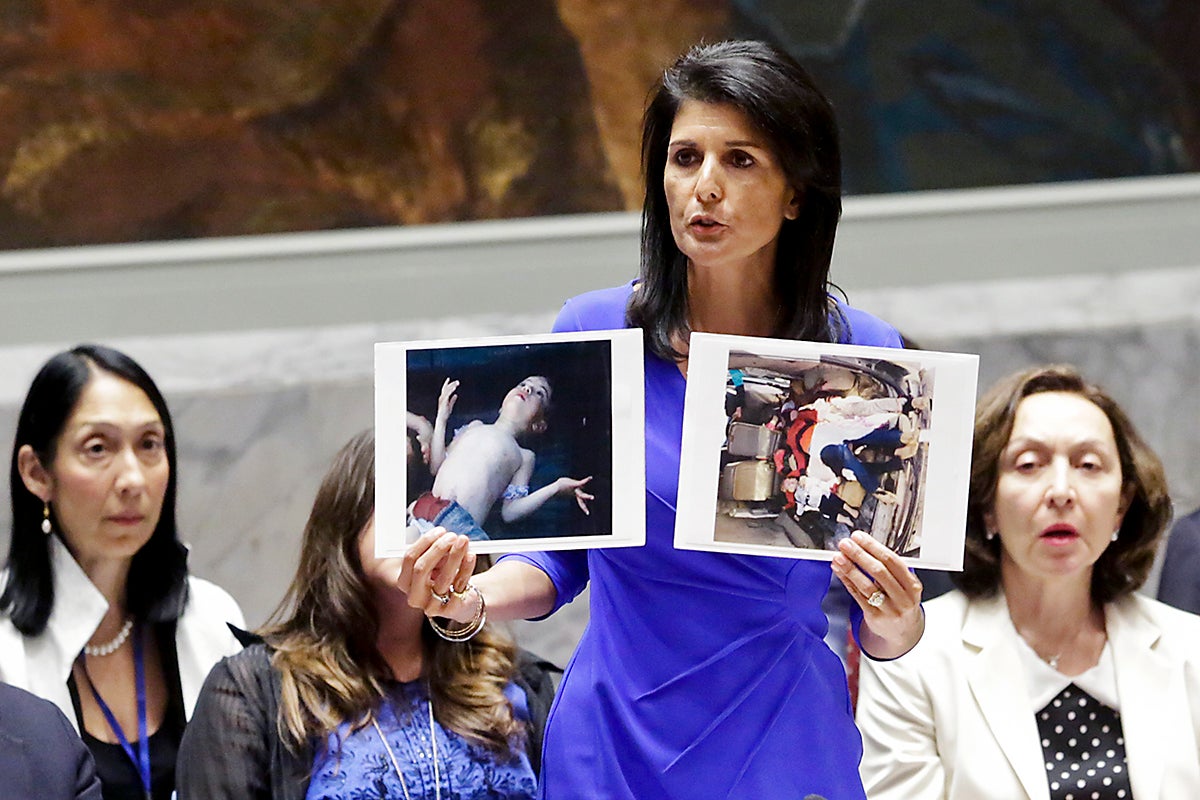The West has proved it cannot hold Russia to account in Syria. How many more have to die before it happens?
This week's atrocity in Khan Sheikhoun was big enough for the international community to sit up and take notice - but scores die in Syria every day, on all sides of the war

In 2013, when pictures of entire Syrian families suffocated in their beds by sarin gas outraged the world, former US President Barack Obama warned the attack was a “red line”.
Almost four years later, Syria’s civil war rages on, and an air raid over a town in rebel-held Idlib province - which according to Medecins Sans Frontieres involved both sarin and chlorine - has reportedly killed at least 52 adults and 20 children.
The attack was big enough for the international community to sit up and take notice. Scores die in Syria every day, on all sides and on every front of the war. More than half a million have lost their lives since it began six years ago, most thanks to conventional munitions. Just last month, the US killed around 50 civilians in Aleppo province after it targeted a mosque instead of an al-Qaeda meeting point.
Despite the horror that was unleashed on Khan Sheikhoun in the early hours of Tuesday morning, it’s probably true that fewer people die in chemical weapons attacks across Syria than they used to. That’s not because they have ceased following condemnation of the 2013 incident in Ghouta, which killed hundreds, but because White Helmets volunteers and medical workers in opposition areas are now practised at dealing with their effects.
Rescue workers say they are now trained how to treat patients who are dying despite no obvious life threatening physical injuries: Strip the victim’s clothing, douse them with water, and remove them from the area. Repeat until you can’t work anymore because you’re blinded by and choking on the gas yourself.
While Damascus has denied any role in Tuesday’s events, there is no other fighting force in Syria capable of such an attack.
The West has been quick to point the finger; Donald Trump’s UN ambassador Nikki Haley even threatened during an emergency Security Council meeting that the US could take unilateral action against the Syrian government if Russia again vetoes sanctions against its ally. This, after it appeared last week the Trump administration was willing to accept President Bashar al-Assad’s rule as a “political reality.”
Trump said today that Tuesday’s attack was an “affront to humanity” which has changed his opinion of Assad, hinting it could affect his policy that the US should focus on defeating Isis in Syria. (As usual, however, he offered nothing in the way of substance on how to end the violence.)
As many have pointed out, the deaths of 12 people in a terrorist sarin gas attack on the Tokyo subway two decades ago were considered a global outrage.
But everything is relative, it seems. The Syrian Observatory for Human Rights reports there have been dozens of chemical attacks most likely carried out by the regime even after it supposedly destroyed its chemical weapons stocks and signed up to the international Chemical Weapons Convention in 2013.
Syrians who have watched their loved ones choke to death on nerve agents already know the chemical weapons ‘red line’ is a fiction. As much as the West would like to pretend the Second World war scared us into never allowing them to proliferate, chemical weapons use is a reality of modern warfare - especially in the Middle East.
To the 21st century’s eternal shame, in Syria's war, chemical weapons have been used with impunity. Now the tide of the conflict has turned in Assad's favour thanks to Russian and Iranian intervention on the ground, there is no reason for the Syrian government to make concessions to weakened opposition forces.
If the US is serious about taking action after the atrocity in Khan Sheikhoun it should ensure that Russia, as one of the guarantors of Syria’s laughable ceasefire, grounds the regime's planes.
Until Moscow is held accountable for failing to stop the Syrian government violating an agreement it brokered, many more civilians are sure to die foaming at the mouth as poison fills their lungs.
Trump’s fledgling White House - riven by internal power struggles - is probably not up to the task. How many more Syrians will have to die before Russia is held accountable for its support of the regime? The answer, sadly, is a lot more of them.
Join our commenting forum
Join thought-provoking conversations, follow other Independent readers and see their replies
Comments